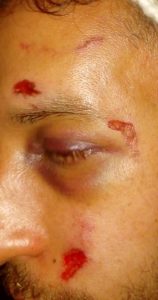As well as the extremely critical situation at the borders of Bosnia-Herzegowina (borderviolence.eu), there is a rising number of reports about police violence in Sarajevo.
In Sarajevo, people are regularly getting beaten up by the police, either by the City Police in blue uniform or the Military Police who wear black uniforms.
These incidents often happen to people whilst they try to make some money by selling packets of tissues on the streets. This is a very common activity for those staying in the camps or Kharabs (empty houses or ruins), as they do not have access to regular work. People staying in Ušivak Camp take public transport to the City Centre everyday, which takes 90 minutes. At nearly every traffic light there is at least one person selling tissues, making it more common than begging in Sarajevo.
One documented case of police violence happened on the 25th of February, to a person working at a traffic light.

Zaccharia was trying to make some money in the City Centre, when a police car stopped and five Officers in blue uniforms got out and started beating him up without any warning. They beat him to the ground using their fists and kicked him multiple times. He suffered several injuries, including open wounds on his face and two black eyes, as seen in the picture. Zaccharia lives with nine people in a small Kharab in Ilidža, a suburb of Sarajevo. Like many people in the streets he has no access to medical infrastructure. That night he went to sleep with open wounds, facing the danger of infections.
This violence is connected to an increase in racist policies and statements made by the government against people in transit (see previous post, press release Ministry of Security). Also rising hostility can be observed through the increase in reports of police violence, as well as racist tendencies in society. These are often communicated verbally but can also materialise in physical outbreaks. In contrast, many people still tolerate people in transit, by at least not calling the police on them for squatting. There are also some local support structures. In addition, there are reports of individuals helping out with money and food, taking into account that Bosnia-Herzegowina is a lower income country in comparison to most of Europe.
Activists fear, that due to the change of the Minister of Security and his anti-migration politics the violence lately witnessed will get worse.
![[RE:]ports Sarajevo](https://reportssarajevo.blackblogs.org/wp-content/uploads/sites/804/2019/02/cropped-logo_v1-1-Kopie-2.png)